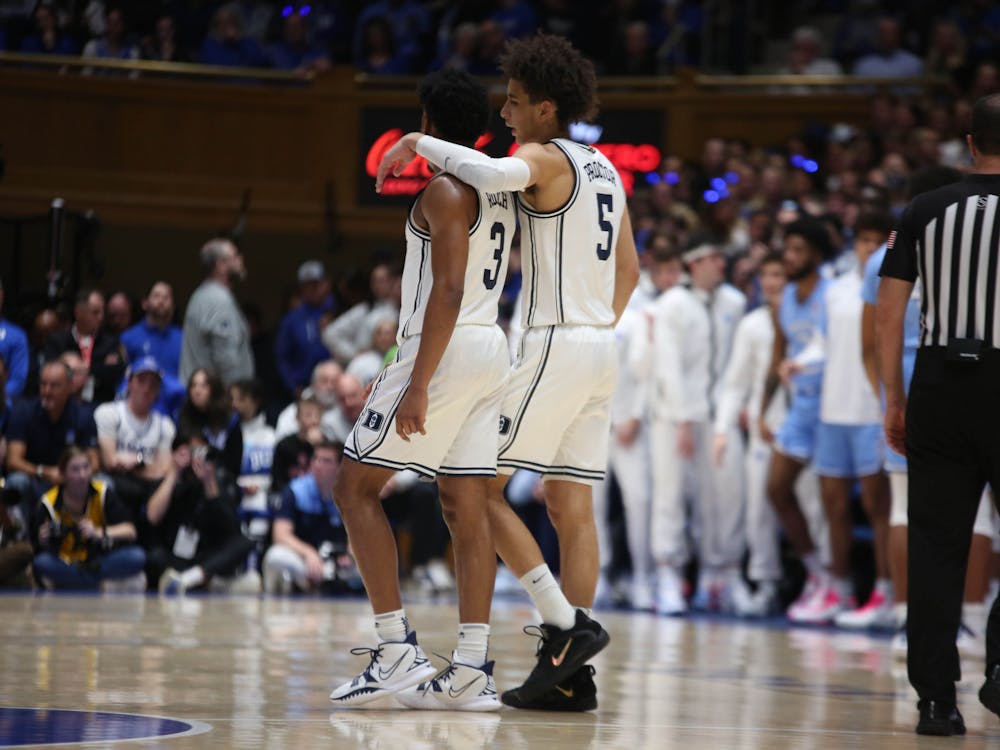“Our offense, we have to take a step in the right direction here.”
During his Jan. 16 media availability, just two days after his team lost 72-64 to Clemson, Jon Scheyer uttered that sentence. With a full week between that loss to the Tigers and a home date with Miami, the 35-year-old was asked what Duke would prioritize in that mini-break.
Well, consider that soundbite a verbal representation of the turning point of the Blue Devils’ season.
Right out of the gate against the Hurricanes, something was just, well, different on the offensive end. The Blue Devils had all sorts of ball and player movement, and the backcourt duo of Jeremy Roach and Tyrese Proctor seemed to have figured out how to play off each other. Bear in mind, this was Roach’s first game back after reaggravating a right toe injury, an ailment that caused the Virginian to miss three straight ACC contests.
Scheyer noticed something different too, saying after the 68-66 Duke victory that he was “proud of our offense.”
Since then, the Blue Devils have continued that mojo. Over its first 18 games, Duke posted an assist rate of 54.7%, a mark that would rank just inside the top 90 nationally. On the other hand, over the last 12 outings, that number is 60.3%, which would put the Blue Devils in the top 20 in the land.
Game by game, the progress is clear. Despite a road loss to Virginia Tech two days after that win against Miami, Kyle Filipowski turned in his most complete performance of the season, with 29 points and four triples — both career-highs. Duke steamrolled Georgia Tech the following Saturday thanks to a 55.7% mark from the floor and a season-high 24 assists, then survived late against Wake Forest by virtue of 54 combined points from Roach, Proctor and Filipowski.
Even against North Carolina, when Duke shot just 39.3% from the field, it was able to get the key buckets to fall down the stretch. With the game knotted at 53-53, Roach slid back into the closer role, notching eight of the Blue Devils’ last 10 points in the 63-57 win.
The offensive growth, though, has not been linear, evidenced by Duke coughing it up 43 total times in road losses to Miami and Virginia the following week. The former was a rout from the tip, while in the latter, Filipowski had his worst outing of the year. The freshman finished with zero points, and his night was marred by a controversial late sequence that has had a ripple effect on the ACC standings.
But over the last five, the growth has continued. The Blue Devils have spaced the floor, cut off the ball and found open shooters to perfection over the last four weeks, and they have developed a level of trust that only comes with more and more reps. After all, Roach found Mark Mitchell for the clinching triple against Notre Dame, and Duke sports a healthy 1.8 assist-to-turnover ratio during its current five-game win streak.
Even its two most highly rated recruits, Dereck Lively II and Dariq Whitehead, are coming into their own.
Lively put on a defensive show against Armando Bacot and North Carolina but has also improved significantly as a lob threat on the other end. The Philadelphia native, over the last five, is averaging 8.2 points on 75% from the field.
Whitehead, to his credit, has been a confident shooter from outside since returning from a lower leg injury Feb. 11 against Virginia. Across the last five games, the freshman is shooting 50% from beyond the arc and is starting to attack the basket with the same authority that made him one of the most coveted talents in the 2022 class. His shot selection still could improve, but it takes a ton of unselfishness to accept a supporting role when you have been the guy your whole life.
The pieces, clearly, are fitting together. From Mitchell to Jacob Grandison to Ryan Young, this group is playing its best basketball of the season. But the driving force has been the Roach-Proctor dynamic.
The two have different skill sets and have complemented each other extremely well over the last month-plus. The Australian is closer to a true floor general, scanning the court off pick and rolls effectively and leading fast breaks with a natural ease. The captain, on the other hand, is terrific at attacking closeouts and getting to his spots in the midrange — and he sure can dish it too, as his 11-assist night against Virginia Tech indicates.
Two talented point guards fitting together has been a past theme at Duke, with Quinn Cook and Tyus Jones in 2014-15 serving as the best case study — and an apt comparison for Roach and Proctor. Cook, the veteran, started at the point for two years before Jones entered as a freshman. And yet, the captain ceded those duties to the Minnesota native, with the duo thriving en route to a national title.
Now, Duke is not on the short list of title contenders, I get that. Heck, the Blue Devils need a win at North Carolina, along with some help, to secure a top-four seed (and double-bye) at next week’s ACC tournament in Greensboro, N.C. But with the way Duke is playing — and more specifically, the way its guards are playing — it could be a dangerous one come March.
Scheyer said after Duke’s Saturday win against Virginia Tech that Roach and Proctor played “close to a perfect game.”
If that’s not a step in the right direction, then I don’t know what is.
Get The Chronicle straight to your inbox
Sign up for our weekly newsletter. Cancel at any time.

Max Rego is a Trinity senior and an associate sports editor for The Chronicle's 118th volume. He was previously sports managing editor for Volume 117.

